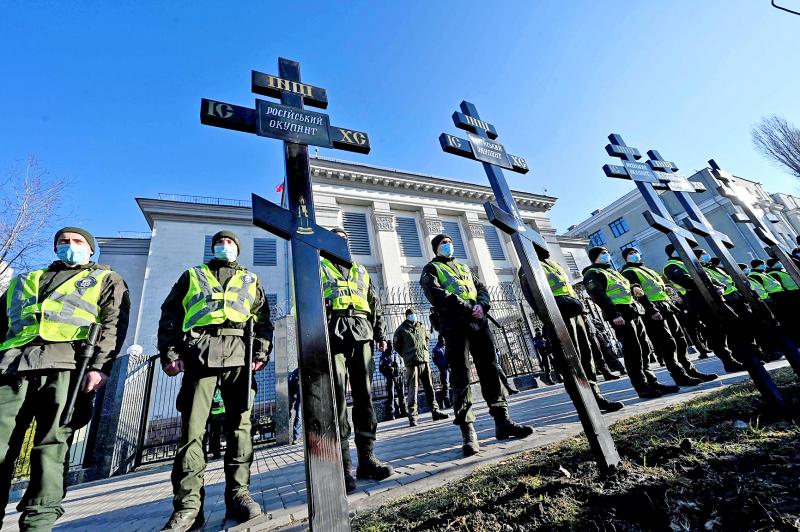Europe yesterday braced for further confrontation and Ukraine urged its citizens to leave Russia after tensions escalated dramatically when Russia’s leader received the approval to use military force outside his country and the West responded with a raft of sanctions.
Hopes for a diplomatic way out of a potential war appeared all but sunk as the US and key European allies accused Moscow on Tuesday of crossing a red line in rolling over Ukraine’s border into separatist regions, with several calling it an invasion.
US Secretary of State Antony Blinken canceled a meeting with his Russian counterpart; Kyiv recalled its ambassador and considered breaking all diplomatic ties with Moscow; dozens of nations further squeezed Russian oligarchs and banks out of international markets; Germany halted a lucrative pipeline deal; and the US repositioned additional troops to NATO’s eastern flank bordering Russia.

Photo: AFP
The Ukrainian Ministry of Foreign Affairs yesterday advised against travel to Russia and recommended anyone there leave immediately, saying Moscow’s “aggression” could lead to a significant reduction in consular services.
Ukrainian Secretary of the National Security and Defense Council Oleksiy Danilov called for a nationwide state of emergency — subject to parliamentary approval.
Danilov said it would be up to regional authorities to determine which measures to apply, but they could include additional protection for public facilities, restrictions on traffic, and additional transport and document checks.
Even as the conflict took a new, dangerous turn, leaders warned it could still get worse. Russian President Vladimir Putin has yet to unleash the force of the 150,000 troops massed on three sides of Ukraine, while US President Joe Biden held back on even tougher sanctions that could cause economic turmoil for Russia, but said they would go ahead if there is further aggression.
Sanctions are key because the West has ruled out taking on Russia militarily.
Ukrainian Minister of Foreign Affairs Dmytro Kuleba urged Western leaders not to wait.
“We call on partners to impose more sanctions on Russia now,” he wrote on Twitter yesterday. “Now the pressure needs to step up to stop Putin. Hit his economy and cronies. Hit more. Hit hard. Hit now.”
Responding defiantly to the steps already taken, Russian Ambassador to the US Anatoly Antonov wrote on Facebook that “sanctions cannot solve a thing.”
“It is hard to imagine that there is a person in Washington who expects Russia to revise its foreign policy under a threat of restrictions,” he wrote.
In Ukraine’s east, where an eight-year conflict between Russia-backed rebels and Ukrainian forces has killed nearly 14,000 people, violence spiked again. One Ukrainian soldier was killed and six more sustained injuries after shelling by the rebels, the Ukrainian military said.
Separatist officials reported several explosions on their territory overnight and three civilian deaths.
While ratcheting up tensions, Putin suggested there was a way out of the crisis, laying three conditions: He called on Kyiv to recognize Russia’s sovereignty over Crimea, renounce its bid to join NATO and partially demilitarize.
However, it was unclear if there was actually any room for diplomacy since the first two demands had been previously rejected by Ukraine and the West as non-starters.

The CIA has a message for Chinese government officials worried about their place in Chinese President Xi Jinping’s (習近平) government: Come work with us. The agency released two Mandarin-language videos on social media on Thursday inviting disgruntled officials to contact the CIA. The recruitment videos posted on YouTube and X racked up more than 5 million views combined in their first day. The outreach comes as CIA Director John Ratcliffe has vowed to boost the agency’s use of intelligence from human sources and its focus on China, which has recently targeted US officials with its own espionage operations. The videos are “aimed at

STEADFAST FRIEND: The bills encourage increased Taiwan-US engagement and address China’s distortion of UN Resolution 2758 to isolate Taiwan internationally The Presidential Office yesterday thanked the US House of Representatives for unanimously passing two Taiwan-related bills highlighting its solid support for Taiwan’s democracy and global participation, and for deepening bilateral relations. One of the bills, the Taiwan Assurance Implementation Act, requires the US Department of State to periodically review its guidelines for engagement with Taiwan, and report to the US Congress on the guidelines and plans to lift self-imposed limitations on US-Taiwan engagement. The other bill is the Taiwan International Solidarity Act, which clarifies that UN Resolution 2758 does not address the issue of the representation of Taiwan or its people in

US Indo-Pacific Commander Admiral Samuel Paparo on Friday expressed concern over the rate at which China is diversifying its military exercises, the Financial Times (FT) reported on Saturday. “The rates of change on the depth and breadth of their exercises is the one non-linear effect that I’ve seen in the last year that wakes me up at night or keeps me up at night,” Paparo was quoted by FT as saying while attending the annual Sedona Forum at the McCain Institute in Arizona. Paparo also expressed concern over the speed with which China was expanding its military. While the US

SHIFT: Taiwan’s better-than-expected first-quarter GDP and signs of weakness in the US have driven global capital back to emerging markets, the central bank head said The central bank yesterday blamed market speculation for the steep rise in the local currency, and urged exporters and financial institutions to stay calm and stop panic sell-offs to avoid hurting their own profitability. The nation’s top monetary policymaker said that it would step in, if necessary, to maintain order and stability in the foreign exchange market. The remarks came as the NT dollar yesterday closed up NT$0.919 to NT$30.145 against the US dollar in Taipei trading, after rising as high as NT$29.59 in intraday trading. The local currency has surged 5.85 percent against the greenback over the past two sessions, central